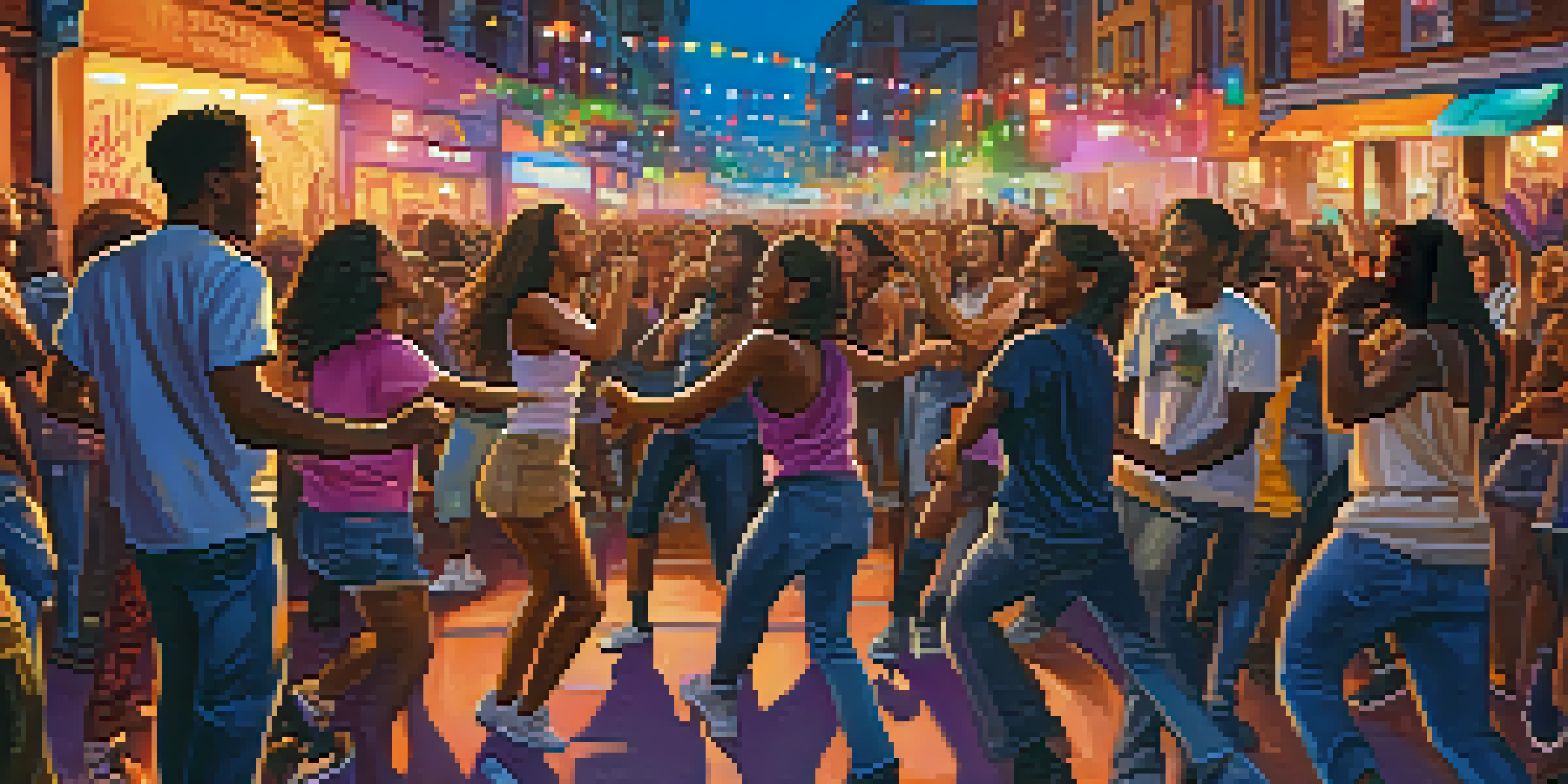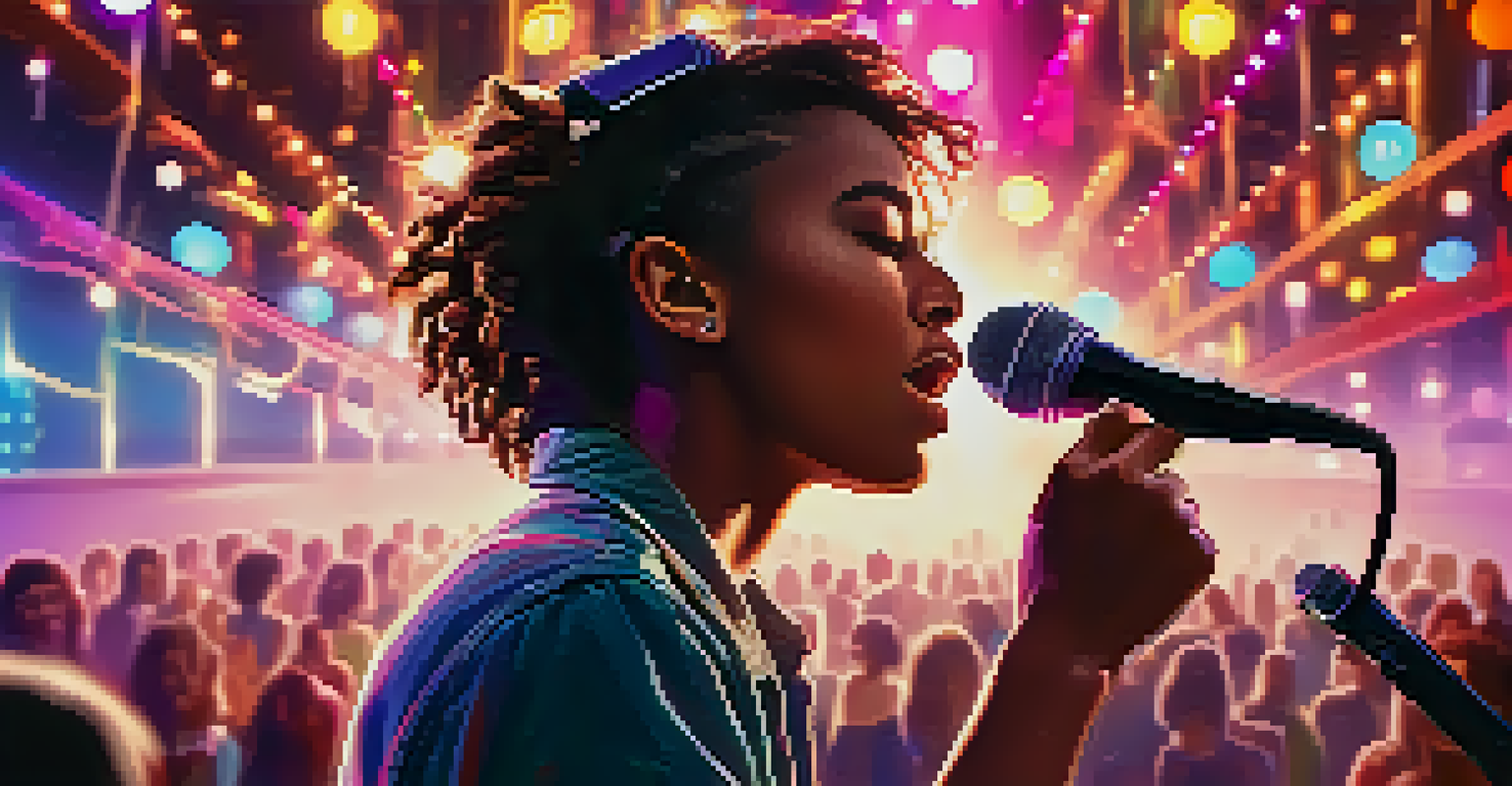Sociological Perspectives on Music and Urban Youth Culture

The Connection Between Music and Identity Formation
Music plays a crucial role in shaping the identities of urban youth. Through genres like hip-hop, punk, and electronic, young people express their beliefs, experiences, and emotions. This self-expression often reflects their socio-economic backgrounds and personal struggles, creating a unique cultural tapestry.
Music is the universal language of mankind.
For many, music becomes an outlet for exploring complex issues such as race, class, and belonging. It serves as a powerful tool for connection, fostering a sense of community among listeners who share similar experiences. This phenomenon illustrates how music can influence identity and provide a voice to the voiceless.
Ultimately, the way urban youth interact with music underscores its significance in their lives. As they navigate their environments, music becomes a key component not just of personal identity, but also of collective cultural identity, enriching their social experiences.
Socialization: How Music Shapes Relationships
Music serves as a social glue, bringing together urban youth from diverse backgrounds. Whether at concerts, festivals, or local hangouts, shared musical experiences foster friendships and social networks. These gatherings create a sense of belonging, helping young people feel connected amid urban life's challenges.

Moreover, music often reflects social dynamics and hierarchies within youth culture. The popularity of certain genres can reveal underlying societal issues, such as class disparities or cultural appropriation. These insights allow youth to critically engage with the music they consume and the relationships they form.
Music Shapes Identity and Community
Urban youth use music as a powerful means of self-expression, reflecting their cultural backgrounds and fostering connections within their communities.
In this way, music not only entertains but also cultivates meaningful connections. By navigating these social environments through music, urban youth learn valuable lessons in collaboration, empathy, and cultural understanding.
Music as a Medium for Social Change
Throughout history, music has been a catalyst for social change, particularly among urban youth. Genres like rap and reggae often address social injustices, empowering young people to voice their concerns and advocate for change. This aligns with the broader sociological perspective that music can influence societal norms and values.
The power of music makes all the difference in the world.
Artists often use their platforms to highlight issues such as racism, poverty, and police brutality. For urban youth, these messages resonate deeply, inspiring activism and community engagement. The power of music to mobilize and unite individuals in pursuit of a common cause is a testament to its cultural significance.
As urban youth embrace music as a form of resistance, they become agents of change in their communities. This dynamic interplay between music and social movements illustrates how deeply intertwined these elements are, shaping both cultural identity and societal progress.
The Impact of Technology on Music Consumption
In today's digital age, technology dramatically influences how urban youth consume music. Streaming platforms and social media have shifted music access from physical formats to virtual spaces, allowing young people to discover diverse genres and artists worldwide. This accessibility fosters a more inclusive music culture.
However, the rise of technology also presents challenges. The sheer volume of content available can create a sense of overwhelm, leading to superficial engagement with music. Urban youth must navigate this landscape carefully, discerning meaningful connections amidst a sea of options.
Technology Transforms Music Access
The rise of streaming platforms has revolutionized how urban youth discover and engage with music, creating both opportunities and challenges in their consumption habits.
Ultimately, technology reshapes the music experience, impacting how youth form identities and communities. As they adapt to these changes, they continue to leverage music as a tool for expression and connection, proving its enduring relevance.
Cultural Appropriation in Urban Music Scenes
Cultural appropriation often arises in discussions about urban music, raising important sociological questions. When artists from dominant cultures adopt elements from marginalized cultures, it can lead to misrepresentation and exploitation. This dynamic is particularly evident in genres like hip-hop, where cultural roots and authenticity are hotly debated.
For urban youth, understanding these nuances is crucial as they engage with various musical influences. Discussions around appropriation encourage them to critically examine their consumption habits and the cultural contexts of the music they love. This awareness fosters a more respectful and informed relationship with diverse musical traditions.
Navigating cultural appropriation in music requires sensitivity and dialogue. By promoting discussions around these issues, urban youth can empower themselves and others, ensuring that music remains a space for authentic expression and celebration of cultural heritage.
The Role of Live Music in Urban Youth Culture
Live music experiences, such as concerts and community events, play a vital role in urban youth culture. These gatherings create spaces for connection, expression, and celebration, allowing young people to experience music in a communal setting. The energy of a live performance can foster a sense of belonging and shared identity among attendees.
Moreover, local artists and underground scenes often thrive in these environments, providing a platform for emerging talent. Urban youth are not just passive consumers; they become active participants in shaping the local music scene. This engagement cultivates a sense of pride and ownership over their cultural landscape.
Live Music Fosters Cultural Pride
Live music events provide urban youth with essential spaces for connection and expression, allowing them to actively participate in their local music scenes.
As urban youth immerse themselves in live music, they gain invaluable experiences and memories. These moments contribute to their cultural identity, reinforcing the idea that music is not just a product, but a vibrant, living part of their community.
Future Trends in Urban Music and Youth Culture
Looking ahead, the intersection of urban music and youth culture will continue to evolve. As globalization and technology further intertwine, new genres and cultural influences will emerge, enriching the musical landscape. Urban youth will likely play a pivotal role in shaping these trends, driving innovation and experimentation.
Additionally, issues like mental health and social justice will increasingly influence the themes explored in music. As young artists respond to their experiences and the world around them, they will continue using music as a powerful medium for self-expression and advocacy.

Ultimately, the future of urban music and youth culture promises to be dynamic and diverse. By embracing change and remaining open to new influences, urban youth can ensure that music remains a vital part of their cultural identity and a vehicle for meaningful social connections.